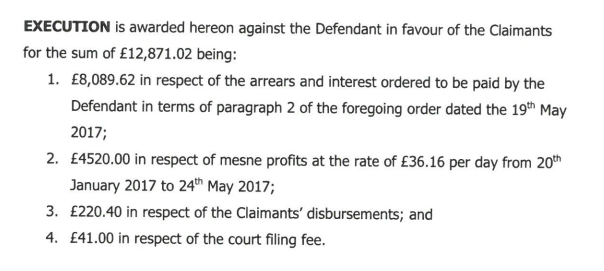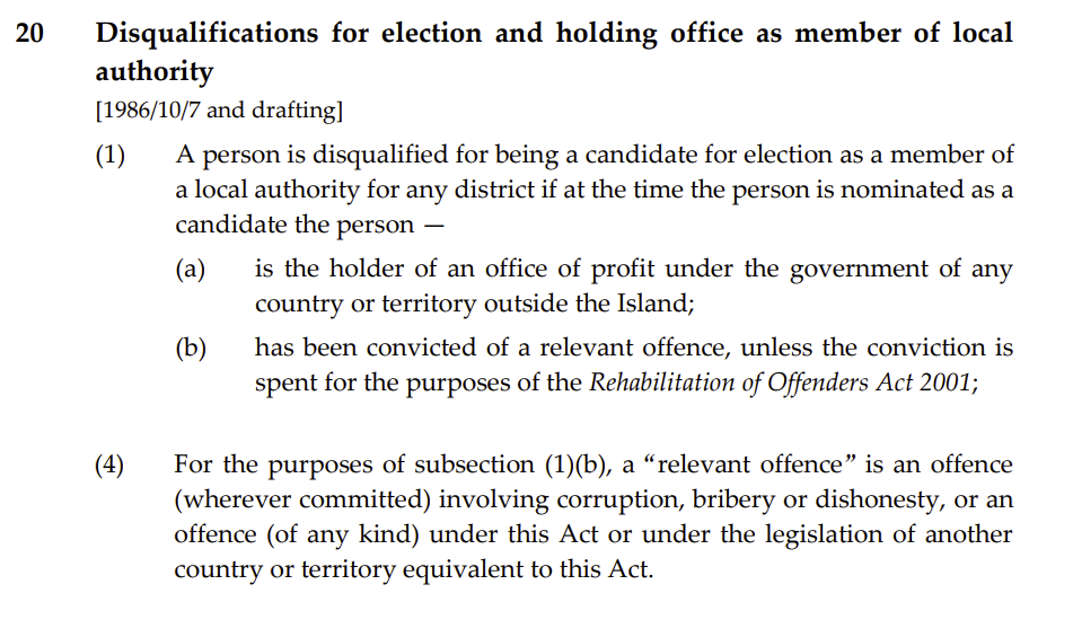
Civil court ruling and unpaid debts raise questions over legal robustness of disqualification rules
A newly elected Onchan Commissioner has resigned just days after a former landlord publicly alleged he left her property damaged and owing thousands in unpaid rent, with court records confirming he was ordered to pay nearly £13,000 in 2017.
John Hamilton stepped down from his position as a member of Onchan District Commissioners and Lead Member for Housing on Monday (2 June), issuing a short statement in which he said he was resigning “with immediate effect” to “protect the integrity of the Authority” and avoid “distraction”. He added he would be making no further comment on the matter.
His resignation came two days after a Facebook post by Island resident Camille Cutajar, which gained significant traction online, being shared more than 130 times and attracting widespread public comment.
Claims of unpaid rent and property damage
In her post, Mrs Cutajar recounted her experience renting out a Douglas property to Mr Hamilton and claimed she was left with more than £10,000 in unpaid rent, significant property damage, and further bills for unauthorised alterations carried out during his tenancy.
She described the stress of pursuing the matter through the courts and her subsequent fears for her family's safety.
Manx Radio has seen court records from case SUM 17/0018, which confirm that in 2017 Mr Hamilton was ordered by the Isle of Man Courts to repay just under £13,000 to Mrs Cutajar.

She claims she has not received any of the money, and that at the time of the ruling, she was informed by court staff that she was one of many creditors. The true number of creditors is unknown, but estimates suggest the number could be in the region of 35.
In addition to the judgment, Manx Radio has seen an incident report and supporting photographs submitted as part of the legal process.
These show extensive damage to the property following a court-ordered eviction, including ripped-up carpets, removed or destroyed bathroom fixtures, stripped light fittings, exposed electrical wiring, and a cooker missing from the kitchen. Items were reportedly found destroyed in the garden.

Mrs Cutajar’s post triggered a wave of comments from others who claimed to have had similar experiences with Mr Hamilton. While Manx Radio has not independently verified each of those claims, they appear to indicate the matter may not be in isolation.
Concerns over public access to court records
While some court judgments can be retrieved, they are not all publicly accessible.
In the case of SUM 17/0018, Manx Radio was required to contact the court directly and pay a small administration fee in order to obtain the document, as it was not listed on the publicly searchable judgments portal.
Mrs Cutajar questions whether this lack of transparency hinders the ability of private landlords to carry out thorough background checks on prospective tenants.
Manx Radio approached the Courts, which clarified that while there is no formal policy governing which judgments are published online, the court endeavours to publish as many substantive decisions as possible in the interest of open justice.
Orders – including those relating to money judgments – are not routinely published online, but can be accessed by request unless restricted by the court.
A publicly accessible Register of Judgments is available for inspection at the courts, and the General Registry is in the final stages of work to amend the Administration of Justice Act 1981, which would introduce a new register aimed at improving accessibility and publishing all Orders that require payment.
Eligibility and vetting rules under the spotlight
The situation has raised questions over the process by which local authority candidates are vetted and whether Mr Hamilton was eligible to stand for office in the first place.
Under Section 20 of the Isle of Man Elections (Keys and Local Authorities) Act 2020, a person is disqualified from standing for election or holding office if they have been convicted of a “relevant offence” which includes offences involving corruption, bribery or dishonesty – unless the conviction is considered spent under the Rehabilitation of Offenders Act 2001.

While Mr Hamilton has not been convicted of a criminal offence in this case, Mrs Cutajar's account, supported by court records, suggests the civil judgment remains active and unresolved.
The legislation does not explicitly clarify whether failure to comply with a court order involving dishonesty – such as non-payment of rent or willful damage – would trigger disqualification. Legally, this would depend on how such conduct is classified, and whether it can be interpreted as constituting a “relevant offence”.
Nomination papers – which all candidates are required to complete as part of the electoral process – clearly set out the full list of qualifications and disqualifications under the 2020 Act. This means prospective candidates are formally made aware of the grounds upon which they may be deemed ineligible to stand.
Once elected, Commissioners are expected to adhere to the Nolan Principles - the seven principles of public life - as stated in Section 28 of Onchan District Commissioners' Standing Orders. These include requirements around honesty, integrity, accountability, and leadership.
Manx Radio asked Onchan District Commissioners and the Cabinet Office what due diligence checks are carried out on prospective candidates, and why Mr Hamilton’s history was not flagged.
Onchan District Commissioners told the Local Democracy Reporting Service it had advised Mr Hamilton to ‘consider’ his position. However, it believes the Authority does not have the legal power to deal with this matter, and the relevant law (the 2020 Act) does not provide for it either.
Manx Radio contacted ODC to query what due diligence processes are in place when individuals are nominated or elected to the board, whether they were aware of the 2017 court judgment against Mr Hamilton at the time of his election or appointment as Lead Member for Housing, and whether the board intends to review its vetting procedures in light of recent developments.
The local authority did not respond.
However, in a statement, the Cabinet Office said it supports local authorities in delivering elections that are “well organised, accessible and fair.” While the elections team can assist with questions about electoral law, local authorities are expected to seek their own legal advice when clarity is needed.
The Cabinet Office confirmed that the Elections (Keys and Local Authorities) Act 2020 sets out disqualification criteria, which include relevant offences such as corruption, bribery or dishonesty, but do not extend to decisions made by civil courts.
It added there are no plans to review or amend disqualification rules, and candidates are responsible for declaring their own eligibility when completing nomination papers.
Mrs Cutajar told Manx Radio she chose to speak out to prevent others from going through similar experiences: “It took me years to feel safe again. When I saw he had been elected and placed in charge of housing, I felt I had to say something. I’ve taken a risk by being public, but this shouldn’t be allowed to happen.”
Mr Hamilton was elected to Onchan District Commissioners in April, but as he was unopposed, no public vote took place. His appointment as Lead Member for Housing was confirmed at the board’s annual meeting in May.
His resignation leaves the board with a vacancy, which will trigger a fresh by-election.
John Hamilton was offered an interview opportunity, but he did not respond.
Is candidate vetting robust enough?
Mr Hamilton’s case is not the only recent instance raising questions about candidate eligibility and vetting within local authorities.
In Castletown, Mahendrakumar Patel was elected as a Commissioner in April, less than two years after his pharmacist’s licence was suspended by the General Pharmaceutical Council.
Mr Patel had previously faced three similar hearings between 2021 and 2022, and Castle Pharmacy – which he operated – was removed from the pharmacy register in May 2023.
Castletown Commissioners confirmed to Manx Radio they were aware of Mr Patel’s disciplinary history, noting that it had been widely reported and was well known within the local community.
However, they stated this information was not part of the formal nomination or vetting process, nor was it required to be disclosed under current electoral law.
The Commissioners explained that eligibility is self-declared by candidates at nomination, and while the Returning Officer ensures statutory criteria are met, no further background or character checks are carried out.
They added that all procedures during the recent local election were compliant with existing legislation, and there are no plans to review internal processes unless Tynwald changes the law.
Separately, Douglas Councillor Mark Wheeler – appointed in the same general election – faced questions from Isle of Man Today about a 2011 finding of misconduct, after he was accused of sending sexually explicit messages to a vulnerable client while working as a probation officer. He was struck off the social care register following a ruling by the General Social Care Council, but maintains the matter has ‘no bearing’ on his current role.
In a statement, Douglas City Council said: “The Council looked into and took advice on the matter and these issues, which are all a matter of public record, and do not disqualify a person from standing for public office."
However, the Council has provided feedback to the Elections Team at the Crown Office that prospective councillors should undergo DBS checks, and that legislation setting out grounds for disqualification from office should be more stringent.
Councillor Wheeler and Commissioner Patel were offered an opportunity to comment, but neither responded.
What these cases highlight is that local authorities largely rely on candidates to self-declare any disqualifying issues – and to withdraw if ineligible. While the current legal framework does not take civil rulings into account, the broader question of whether an individual could uphold the Nolan Principles amid public concern remains open for debate.


 Former air traffic controller speaks out about airport issues
Former air traffic controller speaks out about airport issues
 First in series of 'Isle be Ready' sessions to take place next month
First in series of 'Isle be Ready' sessions to take place next month
 More online services for drivers
More online services for drivers
 New support centre 'an oasis' for cancer patients
New support centre 'an oasis' for cancer patients